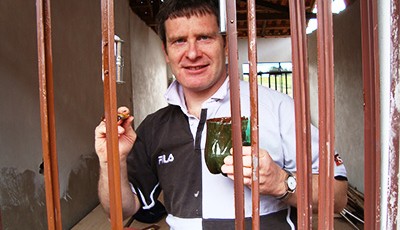Day 10
Up for breakfast and Alison told her story as to how she came to be here. Always great to hear as she first heard me on the radio and responded in 2005! Now in her 6th year here and doing a great job. Boiled eggs appeared too for breakfast and all stocked up we headed to the site.
A few kept to yesterday’s jobs whilst others changed over. The block makers wondered if they could do an extra batch and did the first two really quickly. But the pace and heat took its toll and the their batch again was made but another one would be too much. Another 672 bricks dry in the sun
Block layers were moved up from Cs to B’s by their local counterparts and after a mornings work had laid almost twice as many blocks as day 1 and up to the 4th layer. The interaction was great as team members got to know the guys they were working with. The painters were fewer in number and started on the back of the building so the water boy couldn’t find them at first. They covered a huge area in the morning. One team member almost fainted though as a bit light headed and needed more water.
Chares and Petra who we met the other night visited and we toured the site giving insight as to what we do. They have some things to sort out and hope to return to SL in early 2014. Charles building and practical skills in particular could be a real help so we’ll see if they are to walk with us in the years ahead. Alison worked with Ibrahim Jar on the child sponsorship programme as about 60 children are due shoes.
Lunch included plantain (cooked banana) and team stocked up on water. A few changed their shirts and then off to see the polio ladies at Hastings. Mariama as ever was very welcoming and the team left some significant supplies that will be such a help. Walked around the compound. One idea was that a team could come and do a deep clean as cobwebs were massing in high places that the ladies could never reach from their wheelchairs and crutches.
They showed us how they made soap and then noticed the water pipe was broken. Actually it was cut as the water pressure was so low it would not go up to the tap, 3 ft above the ground. Some of the team realised that they could make the collection of water so much easier for them with a simple device. You know small things can make a huge difference. Found that it would cost £100 to fix their fence – this seemed rather a lot for some sticks and nails and labour?
On to Manaheim home for disabled children. Melrose, who agreed we should come, had decided not to be there and they were feeding the children as we arrived. So all went for a walk around the area and whilst Alison sorted things out. Then back and 30 mins playing with the children. It a tough place, children not well cared for but in truth would mostly be dead if it were not for the love of the staff. Older ones look after younger ones and imaging 3 bed house with 30 disabled children and carers living there and that is it. 5 with epilepsy, 2 with enlarged heads, one with potts disease (meaning his chest sticks out), polio, cerebral palsy and range of autistic behaviours, all under one roof. They get a lot of support but still, such a place.
Back to hotel and met up with Chad. He has been in country 3 years with young family and is well drilling and sorting a dam in Kissy. Also Mark, whose daughter Ella, came with us as staff last year. He got to meet some of the children he sponsors. Arranged for a well to be dug that we have talked about for a year, up in Bo (SLs second town). Learned about the first step enterprise zone which whilst small means there are incentives for companies to start up outside Freetown.
Ibrahim, our carver brought his stuff. Also Hussain the tailor and the team were able to buy a few things. Dinner of Spag bol – very nice and talked over dinner. Then spent an hour reflecting on what we had seen and how the programme was running. We decided to take out a couple of visits as a result. We talked about the value of what we do. Thinking a bit of a difference between places the team spend longer at and short visit. We talked about emotional language like “poverty tourism” and what the local perception is of us. How we feel uncomfortable in different settings and how we see Mission Directs strategy is working. The principle of not owning anything among our partners but consider the challenges of land ownership. People are really engaging at a deep level and each one is challenged in different areas.
And to bed

